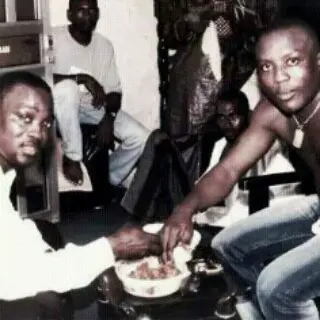Fuji music’s soundscape was markedly different in the ‘00s thanks to the likes of Wasiu Alabi Pasuma who infused English, Pidgin and popular slang in his hip-hop approach to fuji. Pasuma contrived a new style of fuji, evident on records like Orobokibo, which several contemporary fuji acts adopted, ultimately becoming the status quo in fuji mainstream. As Pasuma’s popularity grew among the youth, even among those who weren’t necessarily fuji music fans, another fuji musician, Saheed Osupa, was worming his way into the hearts of the audience with a deeper philosophical approach. Saheed Osupa retained the original use of Yoruba words and adage on his records like in Nini Owo and Ologbon To Sun Bi Ole, which attracted listeners that believed that ‘new school’ fuji was watered down, and considered Osupa to be one of the few true fuji artists left. Naturally, this created a divide between Pasuma and Osupa fans in the early and mid ‘00s. The rivalry between both fuji acts invigorated the genre for years and frequently led to full-blown fights between their individual fan bases. Although they started out as friends, serving under the apprenticeship of Wasiu Ayinde Marshal (Kwam 1) in the ‘90s, Pasuma and Osupa eventually became sworn rivals as they respectively tried to maintain their reputation and status. While Pasuma continued to proclaim himself ‘Oga Nla Fuji’ (which translates to ‘Biggest Boss of Fuji’), Osupa challenged Pasuma’s claim by calling himself ‘Oba Nla Fuji’ (which means ‘Biggest King of Fuji’). Their rivalry finally came to an end in 2015, when Pasuma and Osupa linked up to reconcile, taking pictures together with broad smiles on their faces.
Some other fuji acts that were popular in the ‘00s include Sir Shina Akanni, Alhaji Isiaka Iyanda Sawaba, Alayeluwa Sulaimon, Sule Adio (aka Atawewe), Taye Currency and many others. But none of these fuji artists had the impact that Pasuma had on Nigerian pop and hip-hop. In 1999, pioneering Nigerian hip-hop music group, The Remedies, featured Pasuma on a track “Jealousy”, making it the first collaboration between fuji and hip hop in Nigeria; The Remedies launched their career with Pasuma’s Orobokibo. Pasuma was hip, not only in his music, but also in fashion and lifestyle. It should be noted that hip hop’s influence on the zeitgeist proliferated in the ‘90s, listeners were on the constant lookout for hip-hop trends. This played a major role in the transition that occurred in that era, with Pasuma at its forefront. After his collaboration with the Remedies, Pasuma began to carry a more defined hip-hop influenced identity and image. He called himself ‘African Puff Daddy’ and released an album titled African Puff Daddy. Having been born and bred in Mushin, Pasuma had a repertoire of street slang that he fused neatly in his funky style of fuji music. Riding through cities, specifically in Lagos, you couldn’t miss Pasuma’s face as it adorned walls, windscreens of buses and tricycles. By the early noughts, Pasuma had strongly influenced the mainstream with his fashion and lifestyle choices – he wore a trademark Kangol cap that many of his faithfuls quickly adopted and so the streets of Lagos were littered with impressionable young people sporting Kangols.
“Pasuma wasn’t the first fuji artist to experiment with hip hop but he was definitely the first to make a noticeable transition. And it wasn’t only his music. You could see it in his fashion, in the way he lives,” Jide Taiwo, a media practitioner and writer says, “He practically started that whole movement in fuji.”

Just like Pasuma, some other fuji artists started experimenting with hip-hop, one of whom is Remi Aluko. Remi Aluko thrilled fuji music lovers with his vivacious dance moves and his chic fashion. He would later begin to refer to himself as “African Tupac”, imitating the late rapper’s mannerisms and releasing records like R.E.A.L (Remi Extraordinary Adventure in Life). Around this time, the Nigerian soundscape was experiencing a change – the likes of Tuface Idibia, Ruggedman and Eedris Abdulkareem dished out pop and hip-hop hits. While hip-hop was on the rise in Lagos, a more indigenous style known as street-hop was brewing on the streets, with the likes of Lord of Ajasa, Dekunle Fuji and Jazzman Olofin at the helm, who released smash hits like “Raise da Roof”, “Mo Like Jesu Gan” and “Esa Lo Bade.” These street-hop artists blended fuji intonation and slang in their rap, giving their music a unique flavour that the Nigerian audience rapidly developed a taste for. By the mid ‘00s, there was an obvious intersection between fuji and hip-hop, where fuji artists employed elements from hip-hop and vice versa. With his albums Certificate and Gongo Aso, 9ice took a mix of fuji and hip-hop and forged a ravishing type of Nigerian pop music – Gongo Aso, his sophomore album, sits neatly atop a shelf in the hall of fame of Nigerian albums. A year after the release of 9ice’s Gongo Aso, Wande Coal released his debut album Mushin 2 Mo’Hits, an album that is acclaimed as one of the greatest Nigerian albums ever. Wande Coal’s sound was a medley of soul, R&B, fuji and hip-hop, and he is regarded as the pioneer of Afrobeats.
Over the years, many Nigerian artists have mentioned the influence of fuji in their music. A majority of these acts such as Wizkid, Olamide, Reminisce, Kizz Daniel were raised in environments where indigenous music like fuji was predominant, so by default, they incorporate elements of fuji in their sound. In recent times, you can hear the massive influence of fuji when you listen to new school street-hop artists like Zinoleesky, Barry Jhay (who happens to be Ayinde Barrister’s son), Mohbad, Asake and Bella Shmurda. Fuji has since gone from being an indigenous genre to becoming a global phenomenon. Even though the genre has locally been in serious decline, fuji artists like Wasiu Ayinde Marshal, Pasuma and Saheed Osupa still continue to push the genre’s boundaries. There have since been more frequent collaborations between fuji and Afropop artists including between Olamide and Wasiu Ayinde Marshal on “Omo Anifowose,” Pasuma and Qdot on “Omo Ologo.” A few years back, Pasuma released a hip-hop/pop album My World where he featured the likes of Tiwa Savage, Patoranking, Olamide and Phyno. In 2020, Wasiu Ayinde Marshal put out an EP Fuji The Sound, a modern and less puritanical version of fuji compared to his previous fuji records, where he featured singers like Teni Makanaki and Toby Grey.
Fuji music, a genre that emerged from an indigenous region in Nigeria, has now impacted generations of artists and their music, influencing culture and Nigerian society at large. Despite the reputation it held initially for being a “local” genre during its burgeoning days, fuji music has traversed borders around the world. Names like Sikiru Ayinde Barrister and Wasiu Ayinde Marshal continue to be acclaimed by music listeners both at home and in the diaspora. It is delightful to see the symbiotic relationship between fuji music and contemporary Afrobeats blossom in this day and age as acts from both genres engage in powerful collaborations, keeping fuji alive while catapulting Nigerian pop to worldwide fame.
